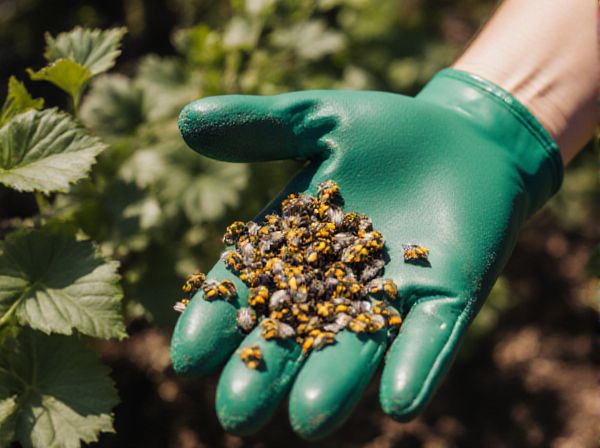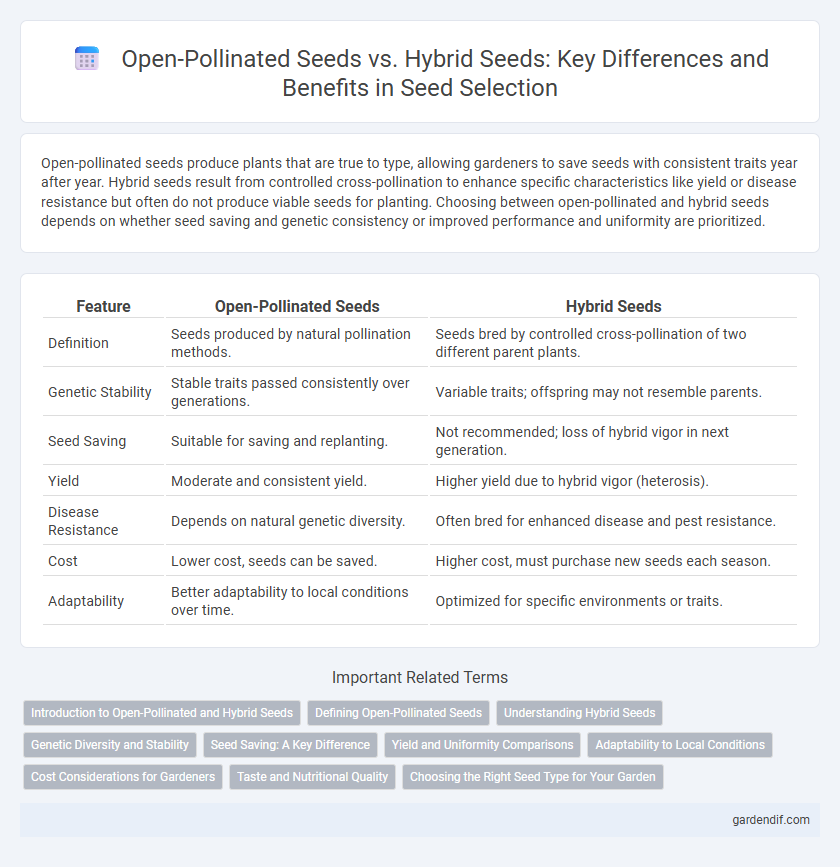
Open-pollinated seeds vs Hybrid seeds Illustration
Open-pollinated seeds produce plants that are true to type, allowing gardeners to save seeds with consistent traits year after year. Hybrid seeds result from controlled cross-pollination to enhance specific characteristics like yield or disease resistance but often do not produce viable seeds for planting. Choosing between open-pollinated and hybrid seeds depends on whether seed saving and genetic consistency or improved performance and uniformity are prioritized.
Table of Comparison
| Feature | Open-Pollinated Seeds | Hybrid Seeds |
|---|---|---|
| Definition | Seeds produced by natural pollination methods. | Seeds bred by controlled cross-pollination of two different parent plants. |
| Genetic Stability | Stable traits passed consistently over generations. | Variable traits; offspring may not resemble parents. |
| Seed Saving | Suitable for saving and replanting. | Not recommended; loss of hybrid vigor in next generation. |
| Yield | Moderate and consistent yield. | Higher yield due to hybrid vigor (heterosis). |
| Disease Resistance | Depends on natural genetic diversity. | Often bred for enhanced disease and pest resistance. |
| Cost | Lower cost, seeds can be saved. | Higher cost, must purchase new seeds each season. |
| Adaptability | Better adaptability to local conditions over time. | Optimized for specific environments or traits. |
Introduction to Open-Pollinated and Hybrid Seeds
Open-pollinated seeds originate from natural pollination processes, allowing plants to reproduce true-to-type and maintain genetic diversity over generations. Hybrid seeds result from controlled cross-pollination between two distinct parent varieties, producing offspring with specific desired traits such as higher yield or disease resistance. Understanding the difference aids gardeners and farmers in selecting seeds that best match their goals for crop consistency and performance.
Defining Open-Pollinated Seeds
Open-pollinated seeds originate from natural pollination methods, such as wind, insects, or self-pollination, allowing plants to produce offspring with stable, true-to-type traits across generations. These seeds offer genetic diversity and adaptability, making them ideal for gardeners seeking heirloom varieties or consistency in plant characteristics. Unlike hybrid seeds, open-pollinated seeds can be saved and replanted without loss of vigor or distinct traits, supporting sustainable gardening practices.
Understanding Hybrid Seeds
Hybrid seeds result from the deliberate cross-pollination of two genetically distinct parent plants to produce offspring with specific desirable traits such as higher yield, pest resistance, or uniformity. These seeds exhibit hybrid vigor, meaning they often outperform open-pollinated seeds in growth rate and stress tolerance. However, hybrids do not reliably produce true-to-type offspring, making seed saving ineffective for maintaining desired characteristics.
Genetic Diversity and Stability
Open-pollinated seeds preserve genetic diversity by allowing natural cross-pollination, resulting in stable traits that remain consistent across generations. Hybrid seeds, created through controlled cross-breeding, often exhibit uniformity and vigor but lack genetic stability, leading to variability in subsequent plant generations. Farmers seeking sustainable crop resilience prioritize open-pollinated seeds for their adaptability and long-term genetic health.
Seed Saving: A Key Difference
Open-pollinated seeds allow gardeners to save seeds that will reliably produce plants true to the parent, ensuring genetic consistency across generations. Hybrid seeds, created by crossing two distinct parent plants, often produce sterile or genetically unstable offspring, making seed saving ineffective. This fundamental difference influences sustainable gardening practices and long-term plant heritage preservation.
Yield and Uniformity Comparisons
Open-pollinated seeds often produce variable yields due to genetic diversity, while hybrid seeds are engineered for consistently higher yields by combining specific parent traits. Hybrid seeds also guarantee uniformity in plant size, maturity, and fruit quality, ensuring predictable crop performance. Farmers prioritizing maximum yield and uniformity typically prefer hybrid seeds despite their higher cost and inability to save seeds for replanting.
Adaptability to Local Conditions
Open-pollinated seeds exhibit higher adaptability to local conditions due to their ability to naturally cross-pollinate and develop traits suited to specific environments over generations. Hybrid seeds, produced by controlled crossing of distinct parent lines, often show uniformity and vigor but may lack resilience to local stresses and require annual purchase for consistent performance. Farmers relying on open-pollinated varieties benefit from seed saving and ongoing adaptation, enhancing crop stability in diverse climates and soil types.
Cost Considerations for Gardeners
Open-pollinated seeds generally cost less than hybrid seeds, offering gardeners an affordable option for sustainable gardening. Hybrid seeds tend to be more expensive due to the specialized breeding process and higher yield potential. Choosing open-pollinated seeds allows gardeners to save money while maintaining seed-saving capabilities for future planting seasons.
Taste and Nutritional Quality
Open-pollinated seeds often produce fruits and vegetables with richer, more complex flavors and higher nutritional content compared to hybrid seeds, which are bred primarily for yield and uniformity. The genetic diversity in open-pollinated varieties enhances antioxidant levels, vitamins, and minerals, contributing to superior taste and health benefits. Hybrid seeds may sacrifice some flavor and nutritional quality due to selective breeding targeting traits like disease resistance and shelf life.
Choosing the Right Seed Type for Your Garden
Open-pollinated seeds offer genetic diversity and the ability to save seeds for future planting, making them ideal for gardeners seeking sustainability and heirloom varieties. Hybrid seeds provide higher yields and disease resistance by crossing specific parent plants, suitable for maximizing crop performance in controlled conditions. Selecting the right seed type depends on garden goals, whether prioritizing preserving plant heritage or achieving consistent, robust harvests.
Open-pollinated seeds vs Hybrid seeds Infographic

 gardendif.com
gardendif.com